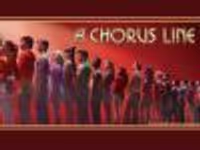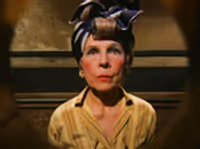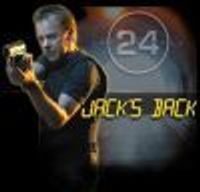A Chorus Line reviews
#75re: A Chorus Line reviews
Posted: 10/6/06 at 11:02amWhat's our current tally? How would you chracterize the reviews on the whole? Mixed-to-positive? There are a lot of mostly positives out there, and yet no real negatives to be found.
#76re: A Chorus Line reviews
Posted: 10/6/06 at 11:03am
Feathah, that's not quite true, as people who saw the show many times during the original run will attest, there were many replacements who were just as good if not better than the original cast members. The problem with the revival cast is that they just don't seem to be part of the original "entity" that was A CHORUS LINE. They don't seem particularly connected to the soul of the piece, and that probably has a lot to do with the fact that Michael Bennett WAS ACL. He drove the show and every person in every replacement company for years after the opening. The show just never will be what it was without his involvement.
I'm thrilled to hear that so many newbies who have never seen the show before are finding much to love with the revival - but there is a sense of "not knowing what they are missing" which, fair or not, is simply impossible to avoid for anyone seeing this new production who experienced the original, and that includes most of the reviewers.
Updated On: 10/6/06 at 11:03 AM
#77re: A Chorus Line reviews
Posted: 10/6/06 at 11:03amwell, for the most part it seems like the reviews are pretty good. Expect for the NY Times, no one else gave it a bad review. There's a few mixed, a lot are good and a few raves.
#78re: A Chorus Line reviews
Posted: 10/6/06 at 11:04amI'd say the over-all consensus is mixed to positive. Even the "raves" aren't exactly ecstatic.
RentBoy86
Broadway Legend Joined: 2/15/05
#79re: A Chorus Line reviews
Posted: 10/6/06 at 12:18pm
"Rentboy, Did you really just call the orignal production of "Sweeney Todd" a tired show?"
---> Not the production itself, but the show. There have been many productions from regional to professional, etc. of the show. It's a show a lot of people know, etc. That's what I meant.
jimnysf
Broadway Legend Joined: 9/10/05
#80re: A Chorus Line reviews
Posted: 10/6/06 at 1:30pm
NJ Star Ledger: "Welcome back, you beautiful thing."
Still a singular sensation
'Chorus Line' revival is faithful to hit musical that ran 15 years
Friday, October 06, 2006
BY MICHAEL SOMMERS
Star-Ledger Staff
NEW YORK STAGE
NEW YORK -- Assuming their familiar poses across that white line stretching the length of the stage, the performers wait and wonder, "Who am I anyway?"
They're hopeful. Variously talented. All desperate for a job. Remember?
Certain viewers (like middle-aged me) are likely to watch the new revival of "A Chorus Line" through a haze of sentiment about their own youthful experiences when this great American musical first hit Broadway so powerfully in 1975.
Others know the show from later in its 15-year run here, thousands of subsequent stagings elsewhere, or even the dismal film.
But plenty of younger people probably have never witnessed "A Chorus Line."
They're fortunate -- and so are the rest of us -- that the production that opened Thursday at the Schoenfeld Theatre is a faithful and altogether loving re-creation of the late Michael Bennett's masterpiece.
Welcome back, you beautiful thing.
Let's explain for newcomers to this work that "A Chorus Line" is Bennett's salute to dancers who anonymously backstop the stars of musicals. Drawn from real-life accounts, the story, sharply written by James Kirkwood and Nicholas Dante, unfolds during auditions for a show as its director, Zach, challenges the dancers to reveal their lives and dreams.
Some responses are monologues, such as Paul's painful coming-out story.
More experiences are woven into dynamic, at times dazzling songs by lyricist Edward Kleban and composer Marvin Hamlisch, like "Hello Twelve," a brilliantly intricate montage of adolescent growing pains. Performed by practically the entire company, it's a wonderfully kinetic mix of music, dialogue and movement.
Anyway, "A Chorus Line" was truly state-of-the-art musical theater 30 years ago and remains pretty terrific today. (Musicals have evolved very little for the better over the years.) Lean and keen in its conciseness, the intermission-free show rolls along rapidly toward its high-kicking finale.
Director Bob Avian and choreographer Baayork Lee, both involved with the original, have wisely chosen not to alter the musical's mid-1970s period or text, although they permit the performers a little room for spontaneity.
Their crisp rendition is definitely staged as an ensemble performance with everybody's elbows tucked in and nobody trying to showboat toward fame. Solid rather than sensational in its execution, the show glows.
The artful simplicity of Robin Wagner's mirror-materializing set and the loveliness of Tharon Musser's pinpoint lighting design (as adapted by Natasha Katz) contributes to the event's appeal, as does the score's ever-exciting orchestrations.
Aficionados will quibble according to their own tastes about various turns -- for instance, Natalie Cortez's should-be spitfire Morales needs more oomph -- but generally the company appears attractive and fast on its feet.
Blond Charlotte d'Amboise is an anxious, determined figure as Cassie, the once featured actress who tries to return to the chorus. Michael Berresse is a severe and self-possessed Zach. Deirdre Goodwin depicts the overripe beauty Sheila with a haughty attitude. Mara Davi's sweet-voiced Maggie, Jason Tam's baby-faced Paul and Michael Paternostro's prideful Gregory are right on the money.
As the newlyweds who help each other out so amusingly in "Sing," sturdy Tony Yazbeck and droll Chryssie Whitehead are a winning team.
In this era of mostly ironic, self-reverential musicals, perhaps the most breathtaking quality about "A Chorus Line" is its utter sincerity. That's really the most old-fashioned thing about the show and its characters. They did it for love.
NJ Star Ledger
MargoChanning
Broadway Legend Joined: 4/5/04
#81re: A Chorus Line reviews
Posted: 10/6/06 at 1:32pmThe Newark Star-Ledger review is on page 3
NJgirl
Broadway Star Joined: 10/13/04
#82re: A Chorus Line reviews
Posted: 10/6/06 at 2:48pmThe Wall Street Journal's review tends to the positive as well. I've got the hard copy in front of me or I'd paste the text.
#83re: A Chorus Line reviews
Posted: 10/6/06 at 2:57pm
"Jason Tam commendably resists oversentimentalizing Paul, the touching homosexual waif..."
I KNEW John Simon couldn't just be positive. He's so funny... (sarcasm)
And the new critic for the Daily News is horrible. They need to find a new one.
#84re: A Chorus Line reviews
Posted: 10/6/06 at 3:36pmIt really seems to me, esspecially from reading BWW'rs reviews, that the people that saw the original didn't really like it while the people that the show was new to loved it. Though I hav't seen the show so i could just be stupid, it seems that the show is very good it just come nowhereclose to the original. This is similar to something that happened to me regarding the Ella Enchanted movie, I am a huge fan of the book and at first I hated the movie becuase they totaly changed the plot, but then I stoped looking at it as a adaption of the book but as a movie and now i love it.
#85re: A Chorus Line reviews
Posted: 10/6/06 at 3:44pm
Newark Star Ledger: "Anyway, "A Chorus Line" was truly state-of-the-art musical theater 30 years ago and remains pretty terrific today. (Musicals have evolved very little for the better over the years.)"
Isn't that sad but true? The art of the musical hasn't advanced since Michael Bennett left us. It's such a shame that Broadway has changed so much. No longer is there an opportunity for anyone to take a huge risk on something that takes us a step in a new or different direction.
#87re: A Chorus Line reviews
Posted: 10/6/06 at 6:42pm
Entertainment Weekly gave it a B+.
Can't find the full text of the review online, but it's in this week's issue.
They said D'Amboise and Goodwin were the weak links...
If I just lay here
Would you lie with me and just forget the world?
neddyfrank2
Broadway Legend Joined: 12/23/05
#88re: A Chorus Line reviews
Posted: 10/6/06 at 7:05pm
I am suprised that the reviews were that good.
I loved it.
I just thought the critics would bash it because they didn't change a thing.
FindingNamo
Broadway Legend Joined: 7/22/03
#89re: A Chorus Line reviews
Posted: 10/7/06 at 1:24am
Okay, I think the capper on this review compendium has to come from Chanticleer's blahhhhg. He used to post here for those who never had the pleasure. His blahhhhhg has been moved to a more downscale location on the web, and is holding at exactly 1 comment from a reader. 1 and 0 more.
Anyhoo. Try to figure out his analysis of the reviews of ACL, and if you do, try to figure out if he switches directions completely for his conclusion.
Chanti, I speak for myself and maybe others when I say, we're glad we hardly knew ye:
The Manhattan Elites are at it again. Simply because the new production of the 1976 musical “A Chorus Line” doesn’t ring with the dead beat values of radical 1970’s liberalism, the elites think that the revival is something less than worthwhile. How stupid. The world has moved on, and “A Chorus Line” did not turn out to be so sweeping after all. It’s another musical, and I’ll bet it’s wonderful. The New York Sun has a better perspective.
I'm not making that up, you know.
#91re: A Chorus Line reviews
Posted: 10/7/06 at 8:55amSo... what percentage of reviews were positive? What percentage were mixed to positive? What percentage were mixed to negative? And what percentage were negative?
#92re: A Chorus Line reviews
Posted: 10/7/06 at 11:16am
Well, I've read the reviews and gave each one a grade and then averaged then out(like Entertainment Weekly does). For example, someone that gave a mixed-positive review gets a B-, a Rave is a A/A+, etc.
Talkin Broadway: C
Associated Press: B-
Gay City News: A+
HollywoodReporter.com: B
NY Times: D+
NBC: B+
TheatreMania: B
amNY: A
Variety: B
Newark Star-Ledger: A
NY Sun: A-
Newsday: B-
John Simon: B
Clive Barnes: C+
NY Daily News: A
Entertainment Weekly: B+
OVERALL AVERAGE: B
neddyfrank2
Broadway Legend Joined: 12/23/05
#94re: A Chorus Line reviews
Posted: 10/7/06 at 5:58pmI really don't think a mixed to positive is a B-. A mixed to positive is a solid B
#95re: A Chorus Line reviews
Posted: 10/7/06 at 6:57pm
Yes. I agree with neddy. You made it unnecessarily complicated.
A negative review should = F
A mixed to neagtive should = D
A mixed review should = C
A mixed ro positive should = B
A positive review should = A
And an absolute rave should = A+
And that's it. It's official. Now please recalculate the percentages based on the above table and report back.
#96re: A Chorus Line reviews
Posted: 10/7/06 at 7:18pmMay "A Chorus Line" run for another five years-at least.
MargoChanning
Broadway Legend Joined: 4/5/04
#97re: A Chorus Line reviews
Posted: 10/10/06 at 12:56am
Feingold once again proves why he's in a completely different league from the rest of the NY critical establishment, both for his prose and his analytical skills:
""Once you've seen everything," runs a lyric in the 1964 Rosalyn Drexler–Al Carmines musical Home Movies, "what is there to see?" The answer—delightfully, ruefully, grimly—is that you can start seeing it all over again, with newly matured eyes. It will look a little different, but it will also look refreshingly the same. "Everything being the same," as Gertrude Stein sagely remarked," everything is always different." I spent a lot of this past week thinking about Stein, Carmines (who set many works by Stein), Drexler, the downtown playwrights of their heyday—and also about James Kirkwood, Nicholas Dante, Edward Kleban, and Michael Bennett, all now long gone, who, with composer Marvin Hamlisch, created A Chorus Line. The latter group probably had only a vague awareness of the downtown theater world in which Carmines's musical enhancements of texts by writers like Stein and Drexler were such a major energizing force.
And yet they caught its vibe: A Chorus Line marks a pivotal moment in the history of the American musical, the end of the old square-built form, with its chunk of book followed by a chunk of song followed by a chunk of dance. A Chorus Line's fluidity in streaming the three elements together was partially learned downtown, where the lack of production resources had forced the invention of a theater that, in its free-form directness, could create virtually anything with actors' bodies on a bare stage. A Chorus Line began, like much downtown work, as a director's vision. Nurtured at the Public Theater, a principal locus of cultural exchange between uptown and downtown, it drew from its performers' own lives and was workshopped over a long period, much the way downtown ensembles often did it. One famous moment in A Chorus Line, where the auditioning dancers hold their résumé shots in front of their faces, echoes a similar moment from one of Joseph Chaikin's late Open Theater pieces, Mutation Show, in which, early on, the actors also hold photographs of themselves in front of their faces. But in Mutation Show, the pictures are of themselves as children. Chaikin's image dramatizes the changes that time works on us all; Bennett's embodies the difference between person and performer. The one is about life, the other about the presentation of life. The same only different.
Bennett did not create A Chorus Line as a commercial Broadway venture. A dancer before he became a choreographer or director, he wanted to explore the themes and questions of his own life the way he saw others, downtown, exploring theirs. He did it using the Broadway forms and materials he knew, drawing on the lives of colleagues and friends. When the result became a giant commercial success, he arranged for those who'd contributed to receive a goodish chunk of his royalties. (That the current producers have thus far declined to follow his precedent is a typical fact of our disheartening time.) The show gets its widespread appeal from Bennett's simultaneous devotion to both the messy personal truth and the glamorous show-business myth of a dancer's life; the cognitive dissonance generates its creative dynamism. Broadway dancing, to the hopeful auditioners, is at once both the most exciting thing in the world and a drudging, grinding, painful, risky way to earn a bare living, with no upward mobility and no guarantee of alternative employment when your body gives out. The childhood impulses and adolescent awakenings that steer people into a dance career, graphed in the cornucopia of personal stories that tumble out in the show's collage of outward presentation and inner monologue, have metamorphosed, by the end, into the dazzling, troubling unity of "One," with its immaculately drilled unison line of spangled strutters. The quintessence of Broadway glamour, it's also dehumanized and empty, a mechanistic tribute to a "she" who isn't there, in a hypothetical show that we know nothing about, with the excitingly varied personalities we've just met welded into an abstract unit. A line is a two-dimensional thing."
http://www.villagevoice.com/theater/0641,feingold,74663,11.html
BSoBW2
Broadway Legend Joined: 12/8/04
#98re: A Chorus Line reviews
Posted: 10/10/06 at 1:12am
"Bennett did not create A Chorus Line as a commercial Broadway venture."
Sounds like the beginning of a letter to Breglio...
Videos








